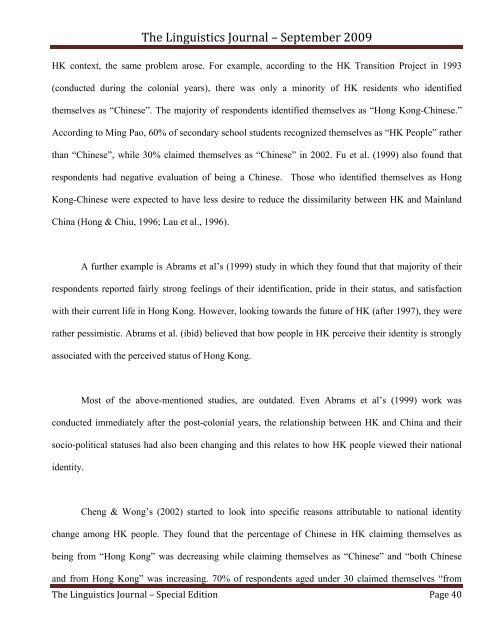The Linguistics Journal September 2009 Special Edition Language
The Linguistics Journal September 2009 Special Edition Language
The Linguistics Journal September 2009 Special Edition Language
You also want an ePaper? Increase the reach of your titles
YUMPU automatically turns print PDFs into web optimized ePapers that Google loves.
<strong>The</strong> <strong>Linguistics</strong> <strong>Journal</strong> – <strong>September</strong> <strong>2009</strong><br />
HK context, the same problem arose. For example, according to the HK Transition Project in 1993<br />
(conducted during the colonial years), there was only a minority of HK residents who identified<br />
themselves as “Chinese”. <strong>The</strong> majority of respondents identified themselves as “Hong Kong-Chinese.”<br />
According to Ming Pao, 60% of secondary school students recognized themselves as “HK People” rather<br />
than “Chinese”, while 30% claimed themselves as “Chinese” in 2002. Fu et al. (1999) also found that<br />
respondents had negative evaluation of being a Chinese. Those who identified themselves as Hong<br />
Kong-Chinese were expected to have less desire to reduce the dissimilarity between HK and Mainland<br />
China (Hong & Chiu, 1996; Lau et al., 1996).<br />
A further example is Abrams et al’s (1999) study in which they found that that majority of their<br />
respondents reported fairly strong feelings of their identification, pride in their status, and satisfaction<br />
with their current life in Hong Kong. However, looking towards the future of HK (after 1997), they were<br />
rather pessimistic. Abrams et al. (ibid) believed that how people in HK perceive their identity is strongly<br />
associated with the perceived status of Hong Kong.<br />
Most of the above-mentioned studies, are outdated. Even Abrams et al’s (1999) work was<br />
conducted immediately after the post-colonial years, the relationship between HK and China and their<br />
socio-political statuses had also been changing and this relates to how HK people viewed their national<br />
identity.<br />
Cheng & Wong’s (2002) started to look into specific reasons attributable to national identity<br />
change among HK people. <strong>The</strong>y found that the percentage of Chinese in HK claiming themselves as<br />
being from “Hong Kong” was decreasing while claiming themselves as “Chinese” and “both Chinese<br />
and from Hong Kong” was increasing. 70% of respondents aged under 30 claimed themselves “from<br />
<strong>The</strong> <strong>Linguistics</strong> <strong>Journal</strong> – <strong>Special</strong> <strong>Edition</strong> Page 40


